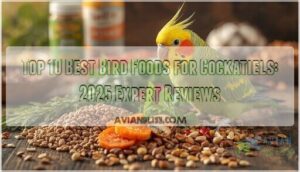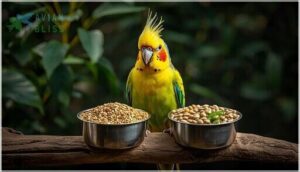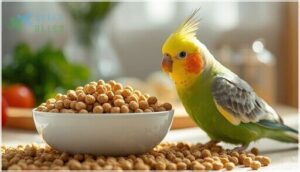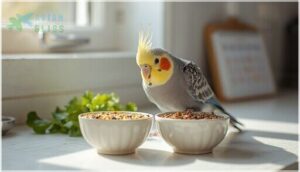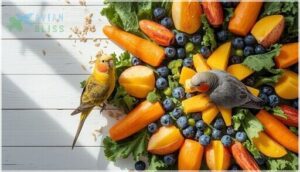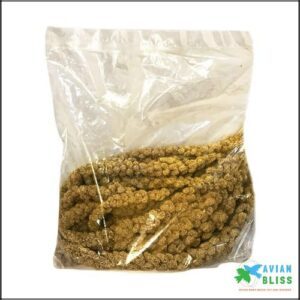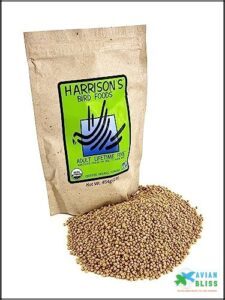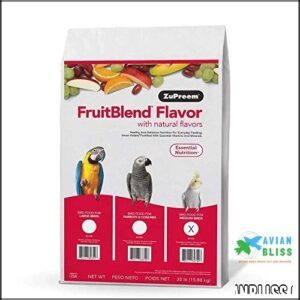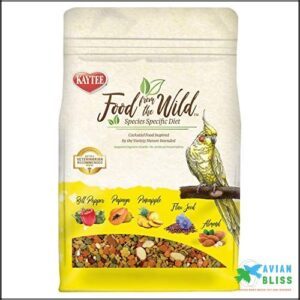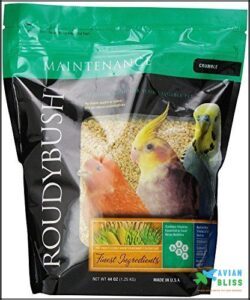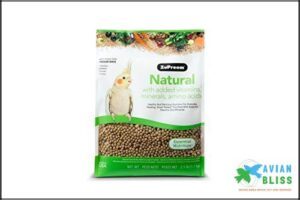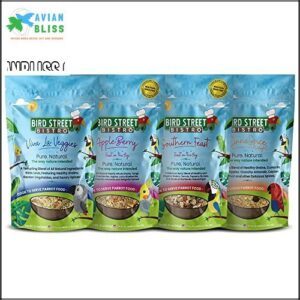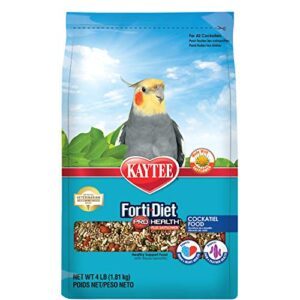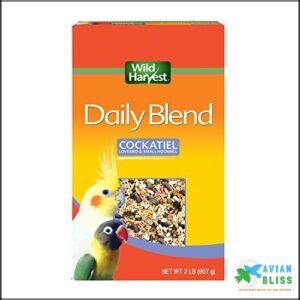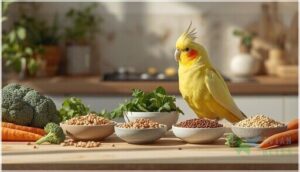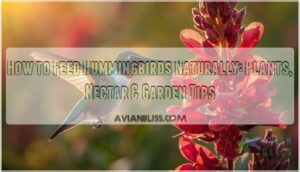This site is supported by our readers. We may earn a commission, at no cost to you, if you purchase through links.
Most cockatiels eating all-seed diets develop nutritional deficiencies within 18 months, yet millions of bird owners still believe seeds alone provide complete nutrition. Your cockatiel’s vibrant feathers, strong bones, and energetic personality depend on a balanced mix of pellets, fresh foods, and carefully selected supplements—but the pet food aisle offers dozens of conflicting options, each claiming to be the best bird food for cockatiels.
Some brands pack their formulas with artificial colors and fillers, while others provide species-specific nutrition backed by avian research. Understanding which products deliver essential vitamins, minerals, and proteins without excess fat can mean the difference between a cockatiel that merely survives and one that thrives for 20-plus years.
Table Of Contents
- Key Takeaways
- Cockatiel Nutrition Basics
- Seed Vs. Pellet Diets for Cockatiels
- Fresh Foods and Safe Treats
- Top 10 Best Bird Foods for Cockatiels
- 1. Sun Dried Millet Bird Treat
- 2. Harrison’s Organic Bird Food Pellets
- 3. ZuPreem Fruit Blend Bird Food Pellets
- 4. Kaytee Cockatiel Bird Food
- 5. Roudybush Daily Bird Food Crumbles
- 6. ZuPreem Natural Bird Food Pellets
- 7. Organic Parrot Food Blend
- 8. Kaytee Safflower Cockatiel Food
- 9. Kaytee Cockatiel Food Pro Health Formula
- 10. Wild Harvest Small Bird Food Blend
- Feeding Tips for Optimal Cockatiel Health
- Frequently Asked Questions (FAQs)
- What is the best food for a cockatiel?
- What is the best seed for cockatiels?
- What cannot cockatiels eat?
- Are pellets better than seeds for birds?
- What to feed a cockatiel?
- How do I choose the best cockatiel food?
- What is the best pellet food for cockatiels?
- Can cockatiels eat parrots?
- Should I feed my cockatiel seeds or pellets?
- What are the healthiest pellets for cockatiels?
- Conclusion
Key Takeaways
- Most cockatiels on all-seed diets develop nutritional deficiencies within 18 months because seeds lack essential vitamins like vitamin A and calcium, making a pellet-based diet (60–70% of intake) supplemented with fresh vegetables the most effective approach for long-term health.
- Quality pellets deliver complete nutrition in every bite with balanced protein (12–18%), controlled fat (6–9%), and proper calcium-to-phosphorus ratios around 1.5:1, eliminating the selective feeding problem that lets birds cherry-pick seeds and miss key nutrients.
- Transitioning from seeds to pellets requires gradual mixing over 2–4 weeks, starting with 25–50% pellets and increasing weekly while monitoring your bird’s weight, droppings, and energy levels to ensure successful acceptance.
- Harrison’s Organic and ZuPreem Natural pellets stand out as top choices because they combine certified organic or naturally sourced ingredients with 21 vitamins and minerals, though all premium formulas should be paired with fresh leafy greens and limited treats like millet to provide complete nutrition.
Cockatiel Nutrition Basics
Understanding what your cockatiel needs to thrive starts with knowing the building blocks of proper nutrition. A well-rounded diet isn’t just about filling the food dish—it’s about providing the right balance of nutrients that keep your bird healthy, active, and happy for years to come.
Let’s break down the essentials every cockatiel owner should know.
Essential Nutrients for Cockatiels
Cockatiel nutrition hinges on five core nutrient categories that work together to keep your bird thriving. You’ll want to verify your feathered friend receives: For detailed guidance on balancing these nutrients through pellets, fresh produce, and healthy treats, explore this comprehensive bird nutrition and diet resource.
- Vitamin A for immune function and mucous membrane health, delivered through leafy greens and quality pellets
- Calcium intake balanced with phosphorus to support bone strength and egg formation
- Protein sources of high quality for feather growth, usually from formulated pellets rather than seeds alone
- Fatty acids including linoleic and alpha-linolenic forms for healthy skin and plumage
Trace minerals like zinc and iodine round out a balanced diet. Verifying the accuracy of nutritional information is vital, much like conducting scientific study audits to verify the validity of research findings.
Balanced Diet Importance
Getting each nutrient right is one thing, but how they work together determines your cockatiel’s long-term health outcomes. A balanced diet that includes varied bird food options—quality pellets, fresh produce, and limited seeds—directly influences feather quality, calcium intake adequacy, and overall vitality.
When you maintain proper nutrient balance through thoughtful cockatiel nutrition, you’re setting the foundation for disease resistance and a longer, healthier life alongside your feathered companion.
Thoughtful cockatiel nutrition builds the foundation for disease resistance and a longer, healthier life with your feathered companion
Common Dietary Misconceptions
Even well-meaning bird owners fall for common nutrition errors that compromise avian health. Understanding these diet fallacies helps you make better choices for your cockatiel care:
- Seed myths: Seeds alone aren’t nutritionally complete despite marketing claims
- All pellets aren’t equal—quality varies dramatically between brands
- Fresh produce won’t cause harm when introduced properly
- Millet spray is a treat, not a meal replacement
- Treats shouldn’t exceed 10% of daily intake
Recognizing these food misconceptions protects your bird’s long-term wellness. Many owners unknowingly feed their parrots foods that leach calcium from bones, so learning which common ingredients to avoid for optimal bird bone health can prevent future deficiencies.
Seed Vs. Pellet Diets for Cockatiels
You’ve probably heard that seeds are bad and pellets are best, but the truth is more nuanced than that. Both options have their place in a cockatiel’s diet, though they work differently and offer distinct advantages and challenges. Whichever you choose, keeping track of your bird’s health means knowing which foods support their nutrition and which ones to skip.
Let’s break down what each feeding approach actually means for your bird’s health and how to make the switch if you decide pellets are the right move.
Pros and Cons of Seed-Based Diets
You’ve probably heard that seeds are a natural choice for your cockatiel, but the reality isn’t so simple. Seed diets can encourage foraging behavior and provide quick energy, yet they’re generally high in fat and low in essential nutrients like calcium and vitamin A. Without careful management, an all-seed approach often leads to selective feeding, obesity, and nutrient imbalances that pellets help correct. Many bird owners are making the switch to pellet-based diets to address these risks, and you can explore proven strategies for transitioning your cockatiel to healthy bird eating habits that support long-term wellness.
| Advantages | Disadvantages |
|---|---|
| Mimics natural foraging instincts | High fat content risks obesity |
| Affordable and widely available | Lacks balanced vitamin and mineral content |
| Energy-dense for active birds | Promotes selective eating habits |
Benefits of Pelleted Bird Food
Switching to pellets can feel like a big leap, but the payoff is real. Pelleted bird food standardizes your cockatiel’s intake of essential amino acids, vitamins A and D3, and calcium, so you don’t have to guess what’s missing. Pellets reduce selective feeding, promote steadier digestion, and lower obesity risk compared to seed-only regimens—giving your bird consistent nutrition in every bite.
| Benefit | What It Does | Why It Matters |
|---|---|---|
| Standardized nutrition | Delivers uniform vitamins and minerals | Aids feather care and beak strength |
| Reduced selective feeding | Prevents cherry-picking preferred seeds | Ensures complete nutrient absorption |
| Improved digestion | Uniform texture aids gut function | Promotes digestive ease and overall bird health |
Transitioning Cockatiels to Pellets
Your cockatiel won’t abandon seeds overnight, so patience is key. Start by mixing 25–50% pellets into familiar seed blends during the first week, then gradually increase pellet portions to 75% by day 14. Weigh your bird weekly, watch for dropping consistency changes, and keep fresh water available—these feeding strategies support a smooth dietary shift while you monitor acceptance and maintain steady nutrition planning.
| Week | Pellet Ratio | Action Step |
|---|---|---|
| 1 | 25–50% | Introduce pellets alongside seeds to build familiarity |
| 2 | 50–75% | Increase pellet introduction and reduce seed volume steadily |
| 3–4 | 75–100% | Finalize shift, remove seeds once pellets are accepted |
Fresh Foods and Safe Treats
Fresh fruits, vegetables, and safe treats add variety to your cockatiel’s diet while supporting natural foraging behaviors and preventing boredom. You’ll want to know which foods boost your bird’s health and which ones can cause serious harm.
Here’s what you can safely offer, plus the items that should never make it into your cockatiel’s cage.
Recommended Fruits and Vegetables
Your cockatiel thrives when fresh produce becomes a daily habit, not an afterthought. Offer diced apples, blueberries, and bell peppers for fruit nutrition packed with antioxidants and vitamin C.
Rotate leafy greens like kale and romaine with steamed broccoli to guarantee vegetable variety. These healthy snacks complement pellets, creating balanced meals that support vigorous bird nutrition and prevent dietary boredom.
Healthy Treat Options (e.g., Millet, Cuttlebone)
Millet benefits your cockatiel through high-energy carbohydrates, ideal for training, while cuttlebone delivers bioavailable calcium for bone and beak health.
These healthy bird food treats support bird nutrition when you practice proper treat portioning—keeping portions under 10-15% of daily intake.
Calcium supplements and foraging toys filled with millet encourage natural behaviors, but don’t let treats replace balanced meals in your routine.
Foods to Avoid for Cockatiels
Protecting your cockatiel means knowing which human food risks can turn deadly—avocado dangers and chocolate poisoning top the toxic food list.
Keep these off-limits:
- Avocado and chocolate contain persin and theobromine, which cause severe toxicity
- Alcohol and high-sodium snacks lead to dehydration and organ damage
- Rhubarb leaves carry compounds harmful to birds
Focus on seed alternatives and pellets for safe nutrition for birds instead.
Top 10 Best Bird Foods for Cockatiels
You’ve covered the basics, understood the difference between seeds and pellets, and learned which fresh foods keep your cockatiel healthy.
Now it’s time to look at specific products that deliver the nutrition your bird needs. The following ten foods represent a range of options, from everyday pellets to treats that encourage natural foraging behavior, each chosen for its quality ingredients and balanced formulation.
1. Sun Dried Millet Bird Treat
Looking for a treat your cockatiel will gobble up? Nemeth Farms’ sun-dried millet spray delivers simple carbohydrates that fuel foraging behavior and beak activity, though you’ll want to offer just a few seeds per session—millet benefits include quick energy, but it shouldn’t replace pellets or fresh vegetables.
This 100% natural, non-GMO treat encourages your bird’s enrichment instincts without artificial additives, making treat variety safer when you rotate it with other snacks.
Store millet in a cool, dry spot to prevent mold and maintain seed nutrition.
| Best For | Cockatiel owners who want a natural, enriching treat that encourages foraging and beak activity without artificial additives. |
|---|---|
| Brand | Nemeth Farms |
| Form | Millet Spray |
| Life Stage | All Birds |
| Weight | 1 Pound |
| Natural Ingredients | Yes |
| Vitamins/Minerals | Natural Nutrients |
| Additional Features |
|
- 100% natural and non-GMO with no artificial colors or added sugars
- Encourages healthy foraging behavior and keeps birds mentally engaged
- Sun-dried to preserve nutrients and freshness
- Seed content can be inconsistent across batches
- Should only be given sparingly to avoid nutritional imbalances
- Packaging quality could be better according to some customers
2. Harrison’s Organic Bird Food Pellets
If you’re ready to upgrade to a pellet diet, Harrison’s Bird Foods stands out with certified organic ingredients and no artificial preservatives. This formula provides balanced Omega 3 & 6 fatty acids while delivering 14% minimum crude protein to support feather health and immune function.
You’ll find that shifting gradually reduces selective eating, and offering these organic bird food pellets alongside fresh vegetables ensures dietary balance without excess fat.
Monitor your cockatiel’s weight during the first two weeks, and store pellets in a cool, dry location to maintain pellet nutrition.
| Best For | Cockatiel owners who want certified organic nutrition and are willing to invest in premium pellets that support long-term health with no artificial additives. |
|---|---|
| Brand | Organic (Not Specified) |
| Form | Pellet |
| Life Stage | Small-Medium Birds |
| Weight | 0.45 kg |
| Natural Ingredients | Yes |
| Vitamins/Minerals | Balanced Nutrition |
| Additional Features |
|
- Certified organic and non-GMO ingredients with balanced Omega 3 & 6 fatty acids for healthy feathers and immune support
- Veterinarian-recommended formula with 14% crude protein that reduces selective eating when introduced gradually
- Human-grade ingredients with no artificial preservatives, colors, or flavors
- Higher price point at $21.99 may not fit every budget
- Pellet size might not work for all birds—some owners find them too large or too small for their cockatiel
- Requires gradual introduction to diet, which can take time and patience during the transition period
3. ZuPreem Fruit Blend Bird Food Pellets
ZuPreem FruitBlend Bird Food Pellets offer a practical alternative when your cockatiel resists plain options, combining ground fruit with 21 vitamins and minerals in five shapes and colors that engage sight-driven foraging.
Each pellet delivers balanced nutrition formulated for medium parrots. Introduce them gradually over 1–2 weeks by mixing with current cockatiel food to encourage acceptance.
Store pellets in an airtight container to preserve freshness, and monitor droppings and energy levels as reliable indicators of how well your bird adjusts to this fruit-flavored formula.
| Best For | Cockatiel owners looking for a fruit-flavored pellet that combines balanced nutrition with visual variety to encourage picky eaters. |
|---|---|
| Brand | ZuPreem |
| Form | Pellet |
| Life Stage | All Life Stages |
| Weight | 17 Pounds |
| Natural Ingredients | Yes |
| Vitamins/Minerals | 21 Vitamins/Minerals |
| Additional Features |
|
- Fortified with 21 vitamins and minerals to support overall health, feather quality, and metabolic function
- Five different shapes and colors appeal to cockatiels’ natural curiosity and sight-driven foraging behavior
- Ground fruit improves palatability for birds that resist plain pellets, making dietary transitions easier
- Some birds may change their preference over time, leading to potential waste or need for diet rotation
- Fruit flavoring and added colors may not suit owners seeking minimally processed or natural ingredient profiles
- Quality control inconsistencies have been reported by some users, requiring careful inspection before feeding
4. Kaytee Cockatiel Bird Food
Kaytee Cockatiel Bird Food blends seeds with fortified pellets to balance cockatiel preferences with nutrient needs, offering a practical middle ground when you’re working toward a healthier diet.
The built-in pellet ratio supplies vitamins and minerals that support feathering and bone health, while millet and seeds keep picky eaters interested.
Shift gradually by mixing this blend with your current food over seven to ten days, watching for steady weight and bright plumage as signs your bird is thriving on the improved nutrient balance.
| Best For | Cockatiel owners transitioning from all-seed diets who want a ready-made blend that combines familiar seeds with fortified pellets to improve nutrition without fighting picky eating habits. |
|---|---|
| Brand | Kaytee |
| Form | Chunk |
| Life Stage | Adult |
| Weight | 2.5 Pounds |
| Natural Ingredients | Yes |
| Vitamins/Minerals | Vitamins/Minerals |
| Additional Features |
|
- Includes fortified pellets mixed with seeds to deliver vitamins and minerals while keeping birds interested
- Contains omega fatty acids and probiotics to support digestive health and feather quality
- Offers mental enrichment through varied textures and shapes that mimic natural foraging
- Some users report receiving dry or stale batches with quality control issues
- Higher price point compared to basic seed mixes at $18.99 for 2.5 pounds
- May still require supplementation with fresh produce to meet all nutritional needs
5. Roudybush Daily Bird Food Crumbles
RoudyBush Daily Maintenance Crumbles deliver complete pellet nutrition in a size that cockatiels handle easily, with 11 percent protein and 6 percent fat supporting year-round maintenance without extra supplements. The corn, wheat, and soy base ensures good bird digestion, while the crumble format reduces waste and gives your bird every nutrient in each bite.
Shift using the gradual mix method—start with three-quarters of your current bird food, then increase the RoudyBush portion weekly until your cockatiel’s daily feeding consists entirely of crumbles for ideal nutrient balance.
| Best For | Cockatiel owners who want a complete pellet diet that cuts down on waste and covers all nutritional needs without extra vitamins or supplements. |
|---|---|
| Brand | RoudyBush |
| Form | Pellet |
| Life Stage | All Life Stages |
| Weight | 17.49 (Price) |
| Natural Ingredients | Yes |
| Vitamins/Minerals | Essential Vitamins/Minerals |
| Additional Features |
|
- Complete nutrition in every bite—11% protein and 6% fat with all essential vitamins and minerals means you don’t need to add supplements
- Crumble size is perfect for cockatiels and reduces the mess and waste you get with seed mixes
- Gradual transition method makes switching foods easier on your bird’s digestion
- Some picky eaters may resist pellets at first and need the food mixed with seeds during the switch
- Requires careful monitoring during transition—you’ll need to watch droppings and weigh your bird daily if using the cold turkey method
- Not suitable for breeding birds or those feeding chicks since it’s formulated only for maintenance
6. ZuPreem Natural Bird Food Pellets
A nutritionally complete formula balances bird health from beak maintenance through digestion, and ZuPreem Natural Bird Food Pellets offer cockatiels that daily foundation with 21 vitamins and minerals plus fresh ground vegetables in every pellet.
The 14–16 percent protein content promotes feather care while controlled fat prevents weight gain, and the uniform beige pellets discourage picky selective feeding that leaves nutritional gaps.
You’ll feed a quarter to half cup daily as the mainstay, then supplement with produce and water for peak cockatiel wellness across all life stages.
| Best For | Cockatiel owners looking for a complete daily diet that delivers balanced nutrition without the guesswork of seed mixes. |
|---|---|
| Brand | ZuPreem |
| Form | Pellet |
| Life Stage | All Life Stages |
| Weight | 2.5 Pounds |
| Natural Ingredients | Yes |
| Vitamins/Minerals | 21 Vitamins/Minerals |
| Additional Features |
|
- Packs 21 vitamins and minerals plus real ground vegetables into every pellet, covering nutritional bases in one scoop
- Uniform pellets stop selective feeding habits that let birds cherry-pick and miss key nutrients
- Works for cockatiels at any age, from weaning chicks to senior birds
- Contains added sugars and corn that some bird owners prefer to avoid for health reasons
- Transition from seeds can take weeks since cockatiels may resist the pellet texture at first
- Packaging issues reported by some buyers, with bags arriving damaged or without protective boxing
7. Organic Parrot Food Blend
Organic certification guarantees that your cockatiel’s seed blend avoids synthetic pesticides and GMO ingredients, and this parrot food delivers clean nutrition with safflower, fortified grains, and millet in an eco-friendly package that reflects responsible farming.
The nutrient balance generally includes 12–18 percent protein and 6–12 percent fat, supporting feather condition while maintaining a healthy weight, though you’ll need to supplement pelleted options like Lafebers for complete mineral coverage.
Feed two to three tablespoons daily, refresh water constantly, and you’ll meet food certifications that match your bird’s natural dietary needs.
| Best For | Bird owners who want certified organic nutrition for their cockatiels and parrots without synthetic pesticides, especially those prioritizing eco-friendly farming practices and natural ingredients. |
|---|---|
| Brand | Bird Street Bistro |
| Form | Dry |
| Life Stage | All Life Stages |
| Weight | 3.18 Pounds |
| Natural Ingredients | Yes |
| Vitamins/Minerals | Natural Ingredients |
| Additional Features |
|
- Clean organic ingredients with no synthetic pesticides, GMOs, or artificial additives, supporting healthier feather condition and overall wellness
- Balanced protein (12–18%) and fat (6–12%) content provides proper nutrition for cockatiels while helping maintain a healthy weight
- Easy daily feeding with simple 2–3 tablespoon portions and straightforward preparation that fits into any routine
- Premium pricing at $49.99 makes it significantly more expensive than conventional bird food options
- Requires supplementation with pelleted foods like Lafebers to ensure complete mineral and vitamin coverage
- Some birds may be picky eaters and need time to adjust, plus the food requires cooking and preparation rather than being ready to serve
8. Kaytee Safflower Cockatiel Food
If your bird picks out sunflower seeds and ignores the rest, you might want to try a blend built around safflower instead. Kaytee’s safflower-based cockatiel food combines this naturally bitter seed with flax and millets, reducing selective feeding while delivering protein, healthy fats, and added prebiotics for digestive health.
The formula includes antioxidants and omega-3s to support immune function and feather quality, and some owners report fewer food allergies compared to heavier seed mixtures, though you’ll still need to balance it with pellets for complete cockatiel nutrition.
| Best For | Cockatiel owners dealing with picky eaters who selectively pick out sunflower seeds and need a healthier alternative that discourages selective feeding. |
|---|---|
| Brand | Kaytee |
| Form | Chunk |
| Life Stage | Adult |
| Weight | 4 Pounds |
| Natural Ingredients | Yes |
| Vitamins/Minerals | Nutritional Supplements |
| Additional Features |
|
- Safflower-based formula naturally discourages selective feeding since birds can’t easily pick out favorite seeds
- Includes prebiotics, probiotics, and omega-3s that support digestion, immune health, and feather quality
- May cause fewer food allergies compared to traditional sunflower-heavy seed mixes
- Multiple reports of moth eggs and infestations arriving in bags, which is a serious quality control issue
- Contains artificial colors and preservatives that some bird owners prefer to avoid
- Still requires supplementing with pellets for complete nutrition, so it’s not a standalone solution
9. Kaytee Cockatiel Food Pro Health Formula
When you want your cockatiel to thrive on a straightforward diet, Kaytee’s Pro Health Formula delivers complete pellet nutrition without the guesswork. This fortified blend aids digestive health through prebiotics and probiotics, while antioxidants and omega-3s protect brain function and promote vibrant feather care.
You’ll find superfoods like flaxseed and spinach alongside essential vitamins for beak health, making it easier to meet your bird’s daily needs. Though some owners report quality control issues with packaging, the formula itself offers solid cockatiel food value for everyday feeding.
| Best For | Cockatiel owners who want a complete pelleted diet that covers daily nutrition without needing extra supplements or seed mixes. |
|---|---|
| Brand | Kaytee |
| Form | Chunk |
| Life Stage | Adult |
| Weight | 5 Pounds |
| Natural Ingredients | Yes |
| Vitamins/Minerals | Various Nutrients |
| Additional Features |
|
- Fortified with prebiotics, probiotics, and omega-3s to support digestion, brain function, and feather health
- Includes nutrient-rich superfoods like flaxseed, spinach, and blueberries for added vitamins
- Widely available and eliminates guesswork by providing balanced nutrition in pellet form
- Quality control issues reported with damaged or old-smelling bags arriving
- Some birds are picky eaters and may only consume certain parts of the food
- Mixed reviews about ingredient balance, particularly regarding sunflower seed content
10. Wild Harvest Small Bird Food Blend
If you’re shopping on a budget, Wild Harvest Small Bird Food Blend offers a simple seed-based cockatiel diet with millet, sunflower seeds, and safflower seeds enriched with orange essence. This 2-pound blend variety provides packaging options for convenient bird nutrition, though you’ll need to balance seed quality concerns with fresh pellets and produce.
Store it in a cool, dry spot for proper food storage, and remember that seed-heavy wild bird food can be fatty—your cockatiel’s bird diet thrives on diverse daily feeding, not seeds alone.
| Best For | Budget-conscious bird owners looking for a straightforward seed mix for cockatiels, lovebirds, and small hookbills who plan to supplement with pellets and fresh foods. |
|---|---|
| Brand | Wild Harvest |
| Form | Seed |
| Life Stage | All Life Stages |
| Weight | 2 Pounds |
| Natural Ingredients | Yes |
| Vitamins/Minerals | Enriched Nutrients |
| Additional Features |
|
- Affordable 2-pound option with a quality seed blend including millet, sunflower, and safflower seeds
- Comes in a barrier bag that keeps the mix fresh and prevents spoilage
- Enriched with orange essence and added nutrients to boost nutritional value
- Seed-heavy formula is naturally high in fat and needs balancing with pellets and produce for a complete diet
- Requires daily cleaning to remove empty hulls and uneaten food, which adds to maintenance
- May not provide enough variety on its own to keep birds healthy long-term without dietary supplements
Feeding Tips for Optimal Cockatiel Health
Choosing the right food is only half the equation—how you offer it matters just as much for your cockatiel’s long-term health.
A few straightforward feeding practices can prevent common nutritional pitfalls and keep your bird thriving. Here are three essential tips that every cockatiel owner should follow.
Portion Control and Meal Frequency
You’ll want to measure portions carefully—cockatiels usually need 5 to 10 grams of bird food per 100 grams of body weight daily, split into two or three feeding windows. Young birds benefit from three smaller meals, while adults do well with twice-daily servings.
Monitor your cockatiel’s crop and body condition weekly, adjusting portion sizes to maintain nutrient balance and prevent obesity through thoughtful dietary adjustments.
Providing Fresh Water
Clean, fresh supply of water matters just as much as the bird food you offer—your cockatiel needs it changed at least once daily to prevent bacteria from multiplying. Use room-temperature water to keep stress low, and scrub the dish weekly to stop biofilm buildup.
Skip mineral-heavy or flavored additives unless your avian veterinarian recommends them for specific health needs.
Monitoring Health and Dietary Adjustments
Watch your cockatiel’s droppings, activity level, and body weight each week—subtle shifts in these health indicators reveal whether your bird diet planning is working or needs dietary tweaks. If your bird suddenly loses weight or plucks feathers, schedule a veterinary checkup and review your nutrition planning approach to verify the formula remains nutritionally complete.
- Regular weight checks: stable weight signals your wellness tracking promotes ideal cockatiel health and balanced avian nutrition
- Behavioral changes: decreased vocalization or lethargy may precede serious issues requiring immediate dietary adjustments
- Blood work monitoring: annual panels detect metabolic concerns and guide weight management strategies for better bird wellness
Frequently Asked Questions (FAQs)
What is the best food for a cockatiel?
A quality pellet formulated for cockatiels, comprising 60–70% of daily intake, paired with fresh vegetables, fruits, and occasional millet treats, delivers the most complete nutrition for your bird’s long-term health.
What is the best seed for cockatiels?
Millet stands out as the best seed for cockatiels—it’s packed with amino acids and essential vitamins while being lower in fat than sunflower seeds, making it perfect for daily feeding and foraging enrichment.
What cannot cockatiels eat?
Your cockatiel’s dietary needs exclude several toxic foods—avoid avocado, chocolate, alcohol, and raw meat entirely.
High-salt processed foods and caffeinated beverages also pose serious health risks, potentially causing organ damage or electrolyte imbalances.
Are pellets better than seeds for birds?
Pellets offer nutritionally complete bird food that prevents selective feeding, promotes feather quality, and reduces obesity risk.
Seeds alone lack calcium and vitamin A.
Combining both meets cockatiels’ dietary needs best.
What to feed a cockatiel?
You’ll want to build your cockatiel’s diet around high-quality pellets—about 60–70% of daily intake—while supplementing with fresh leafy greens, safe vegetables, and occasional fruit to guarantee complete cockatiel nutrition.
How do I choose the best cockatiel food?
Your feathered companion’s health hinges on reading labels carefully. Prioritize pellet quality with balanced protein and fat, add food variety through fresh vegetables, and match dietary needs to your bird’s age and activity level.
What is the best pellet food for cockatiels?
Harrison’s Organic Cockatiel Food leads for pellet nutrition and bird food quality, while ZuPreem Fruit Blend improves acceptance in picky eaters.
Both options deliver nutritionally complete, balanced formulas that support cockatiel health when paired with proper feeding guidelines.
Can cockatiels eat parrots?
Can parrots and cockatiels share meals? Cross-species feeding isn’t recommended—parrot food formulas exceed cockatiel nutritional targets, risking obesity or deficiencies.
Species-specific diets guarantee proper avian nutrition, bird food safety, and peak cockatiel health and nutrition.
Should I feed my cockatiel seeds or pellets?
You should prioritize pellets, which provide nutritionally complete, uniform Bird Digestion support and balanced Dietary Needs.
Seed Nutrition lacks consistency, while Pellet Benefits include controlled vitamins and minerals customized for ideal Cockatiel Food requirements.
What are the healthiest pellets for cockatiels?
You want pellets marked nutritionally complete, with 12–18% protein, 6–9% fat, and a solid calcium-to-phosphorus ratio around 5: Harrison’s, ZuPreem, and Roudybush deliver excellent vitamin content and mineral balance for digestive health.
Conclusion
Picture your cockatiel’s bowl as a foundation for decades of vibrant health—each ingredient either strengthens or weakens that structure. Choosing the best bird food for cockatiels means prioritizing complete nutrition over convenience, investing in quality pellets supplemented with fresh vegetables, and avoiding seed-only shortcuts that compromise longevity.
Your careful attention to dietary details today translates directly into your bird’s energy, feather quality, and lifespan tomorrow. Feed with purpose, not habit.
- https://www.researchgate.net/publication/322281446_Cockatiel_Nymphicus_Hollandicus_Nutrition
- https://www.sciencedirect.com/science/article/abs/pii/S0168159103002405
- https://www.merckvetmanual.com/management-and-nutrition/nutrition-exotic-and-zoo-animals/nutrition-in-psittacines
- https://x.com/godofprompt/status/1990526288063324577
- https://www.linkedin.com/posts/bohdanlukianets_tasks-study-research-activity-7373377539521667072-UTEi

